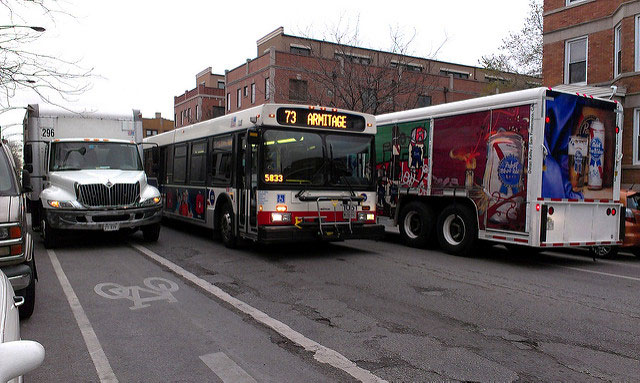
Truthout is an indispensable resource for activists, movement leaders and workers everywhere. Please make this work possible with a quick donation.
Way back in 1985, President Ronald Reagan outlined a very simple principle of tax fairness during a speech at Northside High School in Atlanta, Georgia. Loopholes that allowed millionaires to pay less in taxes in bus drivers, he said, were absurd. That was one of the few times Ronald Reagan was right about something, which makes it all the more amazing that 31 years later, one of the loopholes he was talking about is still one the books.
I’m talking, of course, about the carried interest loophole.
Although it has its origins in the 20 percent profit on goods that ship captains demanded in the medieval glory days of sea trade, the carried interest loophole is today just another carve-out for banksters.
See more news and opinion from Thom Hartmann at Truthout here.
Here’s how it works: Let’s say you’re a hedge fund manager and you’re in charge of a massive hedge fund worth billions of dollars. You, as the hedge fund manager, have a choice of the way you make your money. You can either take it home in the form of a fee, or you can take it in the form of a percentage of the profits accrued from the investments your fund makes. If you choose to take home your money in the form of a fee, it’s taxed at the top income tax rate of 39.6 percent. But if, on the other hand, you decide to take your money home in the form of profits — carried interest — it’s taxed as capital gains, at around 23.8 percent, a huge tax saving for the billionaire hedge fund managers.
In other words, even though the money you’re taking home is, for all intents and purposes, your income, a glorified accounting trick turns it into something else, and your tax bill is a lot smaller as a result. The original idea here was to protect people who invested their own money in risky ventures.
But that’s not how things work these days. There are now so many protections in place for hedge fund managers and general partners that the risk they face is very, very minimal. Giving them a tax break to protect against “risk” is redundant, not to mention costly for the rest of us.
Even though it only benefits about 2,000 people every year, the carried interest loophole costs taxpayers — you and me — about $2 billion in lost revenue every single year. Closing it, some studies have found, could bring in as much $18 billion over 10 years.
This is just common sense; even some banksters themselves know that.
Writing in The New York Times this weekend, Alan J. Patricof, the co-founder and managing director of venture capital firm Greycroft, called on Congress to close the carried interest loophole once and for all. He called it an issue of fairness, which it obviously is.
But there’s another aspect to the carried interest loophole that’s rarely discussed: that hedge funds themselves are often dangerous. They destabilize the economy, and feed off the rest us, often ripping off working people to make money.
They don’t build anything; they’re essentially parasites, and the carried interest loophole often encourages people to join a profession that can pose a big risk to the rest of the economy.
It’s time to repeal the carried interest loophole for both these reasons. And then let’s begin a discussion about regulating or redefining hedge funds to limit the damage they can do to our economy.
A terrifying moment. We appeal for your support.
In the last weeks, we have witnessed an authoritarian assault on communities in Minnesota and across the nation.
The need for truthful, grassroots reporting is urgent at this cataclysmic historical moment. Yet, Trump-aligned billionaires and other allies have taken over many legacy media outlets — the culmination of a decades-long campaign to place control of the narrative into the hands of the political right.
We refuse to let Trump’s blatant propaganda machine go unchecked. Untethered to corporate ownership or advertisers, Truthout remains fearless in our reporting and our determination to use journalism as a tool for justice.
But we need your help just to fund our basic expenses. Over 80 percent of Truthout’s funding comes from small individual donations from our community of readers, and over a third of our total budget is supported by recurring monthly donors.
Truthout has launched a fundraiser to add 500 new monthly donors in the next 9 days. Whether you can make a small monthly donation or a larger one-time gift, Truthout only works with your support.